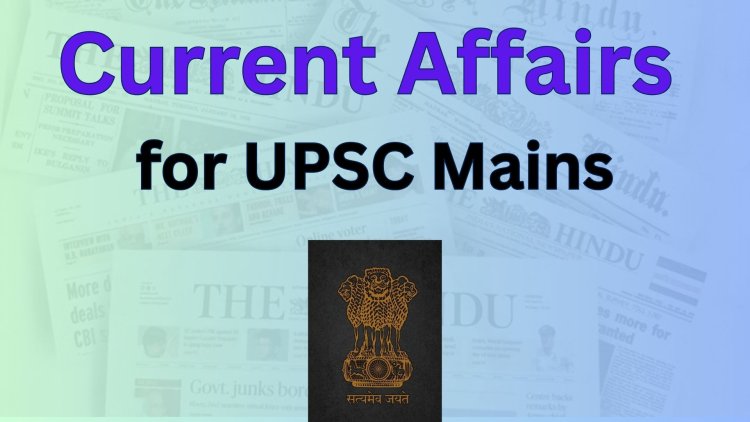Current Affairs for UPSC Mains: A Comprehensive Guide
If you're an aspirant eyeing success in the UPSC Mains, let me tell you straight, current affairs aren't just helpful; they're essential.
Share this Post to earn Money ( Upto ₹100 per 1000 Views )

If you're an aspirant eyeing success in the UPSC Mains, let me tell you straight, current affairs aren't just helpful; they're essential. The examiners aren’t just testing your memory, they’re assessing how well you can understand, analyse, and apply knowledge to real-life situations. That’s where current events come in.
Role of Current Affairs in UPSC Mains
Current affairs form the spine of the General Studies papers. They blend beautifully with the static part of the syllabus. Think about it, what’s the use of knowing Article 370 if you can't relate it to recent developments in Jammu & Kashmir?
Topics like governance, economy, and international relations are always changing, and the UPSC expects you to be on your toes.
Best Sources to Follow
1. Government Websites
Platforms like the Press Information Bureau (PIB), PRS India, and NITI Aayog provide authentic updates directly from the source.
2. Reputed Newspapers and Magazines
The Hindu, Indian Express, Yojana, and Kurukshetra are goldmines. Read the editorials, they sharpen your analysis and writing skills.
3. Online Platforms like Khan Global Studies
This is where tech meets smart prep. Khan Global Studies offers structured, concise, and focused current affairs updates specifically designed for UPSC aspirants.
Major Areas of Focus
Let’s break down the key segments you should never skip.
Polity and Governance
This is UPSC’s favourite playground.
-
Recent Amendments: Keep track of any changes in constitutional provisions.
-
Judgements: Landmark Supreme Court cases like the recent verdicts on electoral bonds or reservation policies could be potential essays or ethics case studies.
Economy
UPSC wants thinkers, not accountants.
-
Union Budget & Economic Survey: Don’t just memorise data—analyse what it means for the common man.
-
RBI Monetary Policy: Interest rate changes, inflation trends—know the 'why' behind the numbers.
Environment and Ecology
With the global climate crisis looming large, this section’s importance is growing every year.
-
COP Summits: What was India’s stance at COP28?
-
Schemes like PM-KUSUM, Jal Jeevan Mission: These have a direct impact and are worth mentioning.
International Relations
Global events can shake India’s foreign policy.
-
India and Neighbourhood: What's the buzz around India-Bhutan relations or tensions with China?
-
Multilateral Platforms: G20, BRICS, SCO, you’ll need to know India’s role and participation.
Science and Technology
Not a techie? Don’t worry. Just focus on applications.
-
ISRO: Updates like Gaganyaan or Chandrayaan-3 can boost your answers.
-
Digital India Initiatives: From 5G to National Quantum Mission, understand the “so what?” angle.
Current Affairs for Essay Paper
An essay with relevant and timely examples can be a game-changer.
Imagine writing on “Democracy in the Digital Age” and citing the role of social media in the 2024 Lok Sabha elections. That’s the kind of edge you need.
Current Affairs for Ethics Paper
Linking real-time case studies or recent moral dilemmas to ethical theories can uplift your paper from good to brilliant. Think about events like the Pegasus spyware case. How does that reflect on privacy and governance?
Tips to Note Current Affairs Effectively
-
Use Digital Notes: Tools like Notion, Evernote or OneNote are perfect for quick tagging and revision.
-
Daily News Analysis: Platforms like Khan Global Studies summarise news in a UPSC-relevant manner a huge time-saver.
-
Weekend Revisions: Reinforce what you’ve read all week.
Monthly vs Daily Current Affairs
Daily
-
Keeps you updated
-
Feels overwhelming without breaks
Monthly
-
Easier to revise
-
Misses the day-to-day analytical flow
Pro Tip: Use daily updates for learning and monthly compilations for revision.
How Khan Global Studies Helps
This platform isn’t just another current affairs website. It’s built with UPSC aspirants in mind.
-
Crisp Notes: Tailored for Mains integration.
-
Topic-Wise Segregation: Revises a breeze.
-
Regular Mock Questions: Helps apply what you’ve learnt.
Mistakes to Avoid While Preparing
-
Blindly Following Too Many Sources: Stick to a few reliable ones.
-
Not Making Notes: Passive reading won’t help in the Mains.
-
Ignoring Analysis: UPSC values your opinion, not just facts.
Revision Techniques
-
Mind Maps: Visual learners, rejoice.
-
Daily Quizzes: Keeps concepts fresh.
-
Peer Discussions: Explaining to others is the best way to retain.
Importance of Answer Writing
Even if you know the topic, can you express it clearly within 150–250 words?
Current affairs can be the “hook” in your answers, the real-world proof that strengthens your arguments.
Conclusion
Let’s be real cracking UPSC Mains without current affairs is like building a house without a foundation. It’s not about knowing every event, but understanding the why, what, and how of those events.
FAQs
Q1: How far back should I study current affairs for UPSC Mains?
At least 12 months before your exam. But for some topics, 2 years of awareness can be helpful.
Q2: Is reading one newspaper daily enough?
Yes, provided you supplement it with monthly compilations and platforms like Khan Global Studies.
Q3: Can I skip current affairs and focus only on static topics?
Not. The exam pattern demands a blend of both.
Q4: How can I make my current affairs answers stand out?
Use keywords, structure your answer well, and include relevant examples or recent events.
Q5: Are daily quizzes necessary?
Yes, they help reinforce learning and test recall, which is crucial for the Mains.
Originally published at http://kgsupsc.wordpress.com on May 28 2025.















